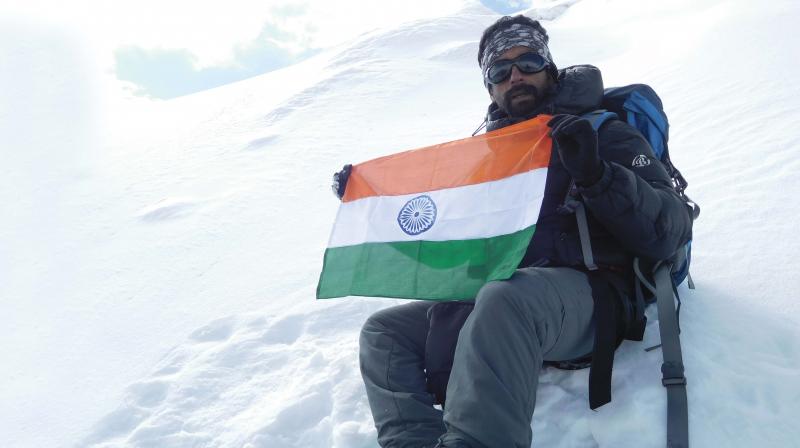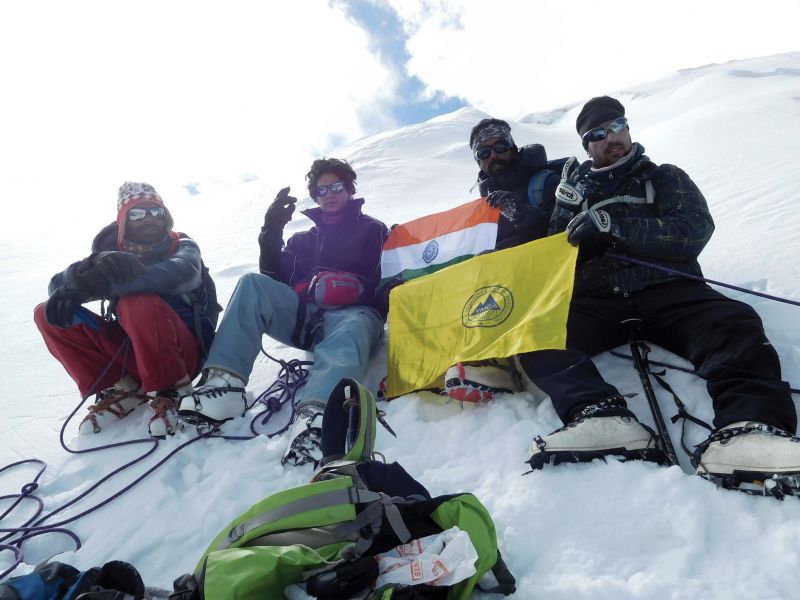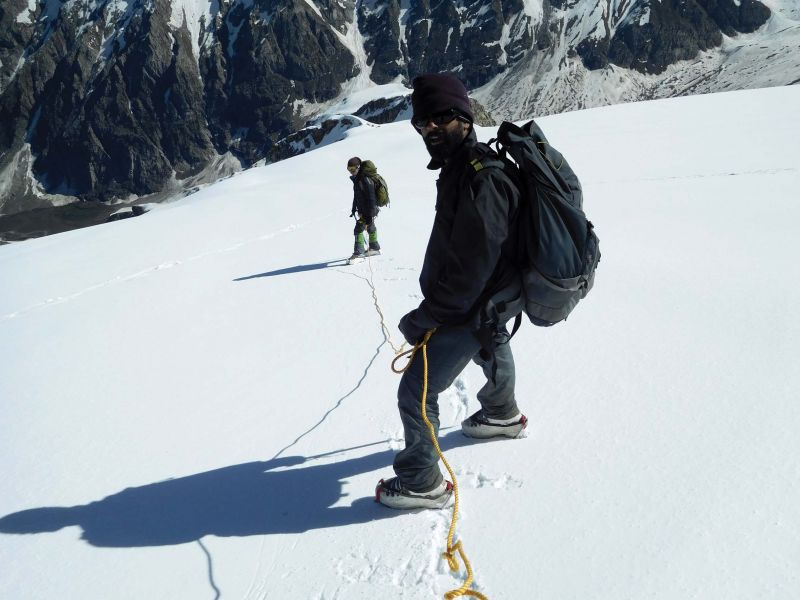Thrissur's mountain man
Preetham Menon lives for adventure.His latest conquest is Mount Cheema in Himachal Pradesh.

Sometimes, you need to use clichés like 'amazing'. That or one of its synonyms will ultimately be the first word you use on hearing the story of Preetham Menon. He walks into the room, thin-built and not too tall, and calmly tells you about his latest adventure — conquering Mount Cheema in Himachal Pradesh, a mountain that's more than 20,000 feet high. And that's about the 10th mountain he climbed in the last seven years.
"It started with this desire to visit Kashmir. Then I heard about the army institute in Kashmir that offers mountaineering training for civilians as well. I did my basic mountaineering course there, and later an advanced course," Preetham says, on a day he is in Kochi. He hails from the neighbouring district, Thrissur — born there, grew up there and has the singsong Malayalam of Thrissur too. And this Thrissur karan is the one climbing all these big mountains and inspiring others too, as part of his adventure consultant job. "Mountaineering had been my passion and I turned it into my profession, taking scouts and groups, training corporates and colleges etc."
Climbing on, cheating death
The first of these mountains he climbed is the Stok Kangri, more than 20,000 feet high in the Ladakh region, in 2011. "It is not the height, it is the technical difficulty that you need to conquer. Like very long moraines." Next year and the year after that, he went up the Golep Kangri again in the Ladakh region.
In 2014, he took a team from Kerala up Mulkila 4. Mulkila 5, Deo Tibba and Chandrabhaga 14 were the expeditions in 2015. Then there was the Friendship Peak ('not friendly at all, don't go by the name') and Manirang last year. This year Preetham went up the Jagat Suk peak before the Independence Day trip to Mt Cheema.
 This year Preetham went up the Jagat Suk peak before the Independence Day trip to Mt Cheema.
This year Preetham went up the Jagat Suk peak before the Independence Day trip to Mt Cheema.
"On Independence Day, we got together at Manali — there was a team of six climbers — and made the preparations. The next day we began the trip from Manali by road," Preetham says. They crossed Rohtang pass and reached Batal. "There is one small dhaba there, called Chacha and Chachi, run by an old couple. There is nothing else for a long way. No tarred roads. It's all gravel and rock. We pitched our tents in Batal for the day." The next day they waited for mules that will take them and their luggage across four streams. "It is called the Karcha Nalla. You need to cross these four streams before 12 in the noon, because water gets too heavy after that." They managed to cross three and waited for the sun to come down to cross the fourth. It is so dangerous that there are tributes in stone to the many climbers who have lost their lives there.
 The next day some of the climbers fell sick, and only three including Preetham were to proceed.
The next day some of the climbers fell sick, and only three including Preetham were to proceed.
Once they crossed the streams they came to a transit camp. With the six climbers was a technical team of four. The next morning they began climbing till they reached the advance base camp. "Mount Cheema comes visible only once you reach there, in all its glory." The next day some of the climbers fell sick, and only three including Preetham were to proceed. They began the process of acclimatisation by first finding a route to set up a camp (camp 1) and then coming back to the advance base camp, to adjust to the altitude. Next day they shifted to camp 1, found a place for camp 2 further up, and came back to camp 1. Negotiating a safe path is very tricky with many crevasses in between.
Once they reached camp 2, it was decided only Preetham will go up the summit with the technical team. "We started at 2 am, because the crevasses generally close up in the morning and there is less chance of an avalanche." So with all the technical gear and food and water, they started in the dark, the climbers roped to each other. There were three ice walls on the way. After the ice walls, they reached the shoulder of the mountain at 8 am, and edged their way to the summit at 8.30. They hoisted the tricolour. And then began the climb down. To camp 2 first, joining the other two climbers and then all the way to the advance base camp. By then it was 5 pm. "I was dead tired and went to sleep for some 24 hours," Preetham says. They waited two more days for the mules before coming back down and celebrating at the Chacha and Chachi’s dhaba.
It is not that Preetham is fearless. “I begin to shake in front of Mother Nature. When you are up there, at 15 to 18,000 feet high, and no oxygen, you think 'what the hell are you doing there'. Even if you are an atheist, you start praying. But when you come down, you can't wait to go up again. It is because it is very close to death. People jump out of parachutes with that same feeling — of cheating death. And on top of the mountains you also realise your limitations. Despite all that, I feel a lot safer in the mountains than when I am back in Thrissur. It is not complicated there."
The first of these mountains he climbed is the Stok Kangri, more than 20,000 feet high in the Ladakh region, in 2011. "It is not the height, it is the technical difficulty that you need to conquer. Like very long moraines." Next year and the year after that, he went up the Golep Kangri again in the Ladakh region.
In 2014, he took a team from Kerala up Mulkila 4. Mulkila 5, Deo Tibba and Chan-drabhaga 14 were the expeditions in 2015. Then there was the Friendship Peak ('not friendly at all, don't go by the name') and Manirang last year. This year Preetham went up the Jagat Suk peak before the Independence Day trip to Mt Cheema.
"On Independence Day, we got together at Manali — there was a team of six climbers — and made the preparations. The next day we began the trip from Manali by road," Preetham says. They crossed Rohtang pass and reached Batal. "There is one small dhaba there, called Chacha and Chachi, run by an old couple. There is nothing else for a long way. No tarred roads. It's all gravel and rock. We pitched our tents in Batal for the day." The next day they waited for mules that will take them and their luggage across four streams. "It is called the Karcha Nalla. You need to cross these four streams before 12 in the noon, because water gets too heavy after that." They managed to cross three and waited for the sun to come down to cross the fourth. It is so dangerous that there are tributes in stone to the many climbers who have lost their lives there.
Once they crossed the streams they came to a transit camp. With the six climbers was a technical team of four. The next morning they began climbing till they reached the advance base camp. "Mount Cheema comes visible only once you reach there, in all its glory." The next day some of the climbers fell sick, and only three including Preetham were to proceed. They began the process of acclimatisation by first finding a route to set up a camp (camp 1) and then coming back to the advance base camp, to adjust to the altitude. Next day they shifted to camp 1, found a place for camp 2 further up, and came back to camp 1. Negotiating a safe path is very tricky with many crevasses in between.
Once they reached camp 2, it was decided only Preetham will go up the summit with the technical team. "We started at 2 am, because the crevasses generally close up in the morning and there is less chance of an avalanche." So with all the technical gear and food and water, they started in the dark, the climbers roped to each other. There were three ice walls on the way. After the ice walls, they reached the shoulder of the mountain at 8 am, and edged their way to the summit at 8.30. They hoisted the tricolour. And then began the climb down. To camp 2 first, joining the other two climbers and then all the way to the advance base camp. By then it was 5 pm. "I was dead tired and went to sleep for some 24 hours," Preetham says. They waited two more days for the mules before coming back down and celebrating at the Chacha and Chachi’s dhaba.
It is not that Preetham is fearless. “I begin to shake in front of Mother Nature. When you are up there, at 15 to 18,000 feet high, and no oxygen, you think 'what the hell are you doing there'. Even if you are an atheist, you start praying. But when you come down, you can't wait to go up again. It is because it is very close to death. People jump out of parachutes with that same feeling — of cheating death. And on top of the mountains you also realise your limitations. Despite all that, I feel a lot safer in the mountains than when I am back in Thrissur. It is not complicated there."

